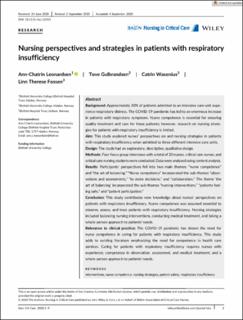Nursing perspectives and strategies in patients with respiratory insufficiency
Peer reviewed, Journal article
Published version
Permanent lenke
https://hdl.handle.net/11250/2728764Utgivelsesdato
2020Metadata
Vis full innførselSamlinger
Sammendrag
Background
Approximately 30% of patients admitted to an intensive care unit experience respiratory distress. The COVID‐19 pandemic has led to an enormous increase in patients with respiratory symptoms. Nurse competence is essential for ensuring quality treatment and care for these patients; however, research on nursing strategies for patients with respiratory insufficiency is limited.
Aim
This study explored nurses' perspectives on and nursing strategies in patients with respiratory insufficiency when admitted to three different intensive care units.
Design
The study had an exploratory, descriptive, qualitative design.
Methods
Four focus group interviews with a total of 20 nurses, critical care nurses, and critical care nursing students were conducted. Data were analysed using content analysis.
Results
Participants' perspectives fell into two main themes: “nurse competence” and “the art of balancing.” “Nurse competence” incorporated the sub‐themes “observations and assessments,” “to make decisions,” and “collaboration.” The theme ‘the art of balancing’ incorporated the sub‐themes “nursing interventions,” “patients feeling safe,” and “patient participation.”
Conclusion
This study contributes new knowledge about nurses' perspectives on patients with respiratory insufficiency. Nurse competence was assumed essential to observe, assess, and treat patients with respiratory insufficiency. Nursing strategies included balancing nursing interventions, conducting medical treatment, and taking a whole‐person approach to patients' needs.
Relevance to clinical practice
The COVID‐19 pandemic has shown the need for nurse competence in caring for patients with respiratory insufficiency. This study adds to existing literature emphasizing the need for competence in health care services. Caring for patients with respiratory insufficiency requires nurses with experience; competence in observation, assessment, and medical treatment; and a whole‐person approach to patients' needs.

